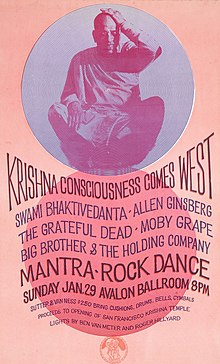
The Mantra-Rock Dance was a counterculture music event held on January 29, 1967, at the Avalon Ballroom in San Francisco.[1] It was organized by followers of the International Society for Krishna Consciousness (ISKCON) as an opportunity for its founder, A. C. Bhaktivedanta Swami Prabhupada, to address a wider public.[2] It was also a promotional and fundraising effort for their first center on the West Coast of the United States.[3][4]
The Mantra-Rock Dance featured some of the most prominent Californian rock groups of the time, such as the Grateful Dead[5][6] and Big Brother and the Holding Company with Janis Joplin,[7] as well as the then relatively unknown Moby Grape.[8][9] The bands agreed to appear with Prabhupada and to perform for free; the proceeds were donated to the local Hare Krishna temple.[3] The participation of countercultural leaders considerably boosted the event's popularity; among them were the poet Allen Ginsberg, who led the singing of the Hare Krishna mantra onstage along with Prabhupada, and the LSD promoters Timothy Leary and Augustus Owsley Stanley III.[3][10]
According to author Margaret Wilkins, the Mantra-Rock Dance concert was "the ultimate high"[4][11] and "the major spiritual event of the San Francisco hippie era."[3] It led to favorable media exposures for Prabhupada and his followers,[12] and brought the Hare Krishna movement to the wider attention of the American public.[10] The 40th anniversary of the Mantra-Rock Dance was commemorated in 2007 in Berkeley, California.[13]
- ^ Cohen 1991, p. 106
- ^ Ellwood 1989, p. 106
- ^ a b c d Chryssides & Wilkins 2006, p. 213
- ^ a b Greene 2007, p. 85
- ^ Schinder & Schwartz 2008, p. 335
- ^ Buckley 2003, p. 444
- ^ Buckley 2003, p. 91
- ^ Goswami & Dasi 2011, p. 160
- ^ Siegel 2004, pp. 8–10
- ^ a b Chryssides 2001, p. 173
- ^ Ellwood & Partin 1988, p. 68
- ^ Goswami & Dasi 2011, pp. 201, 262, 277
- ^ "Arts Calendar". Berkeley Daily Planet. August 17, 2007. Retrieved February 7, 2011.